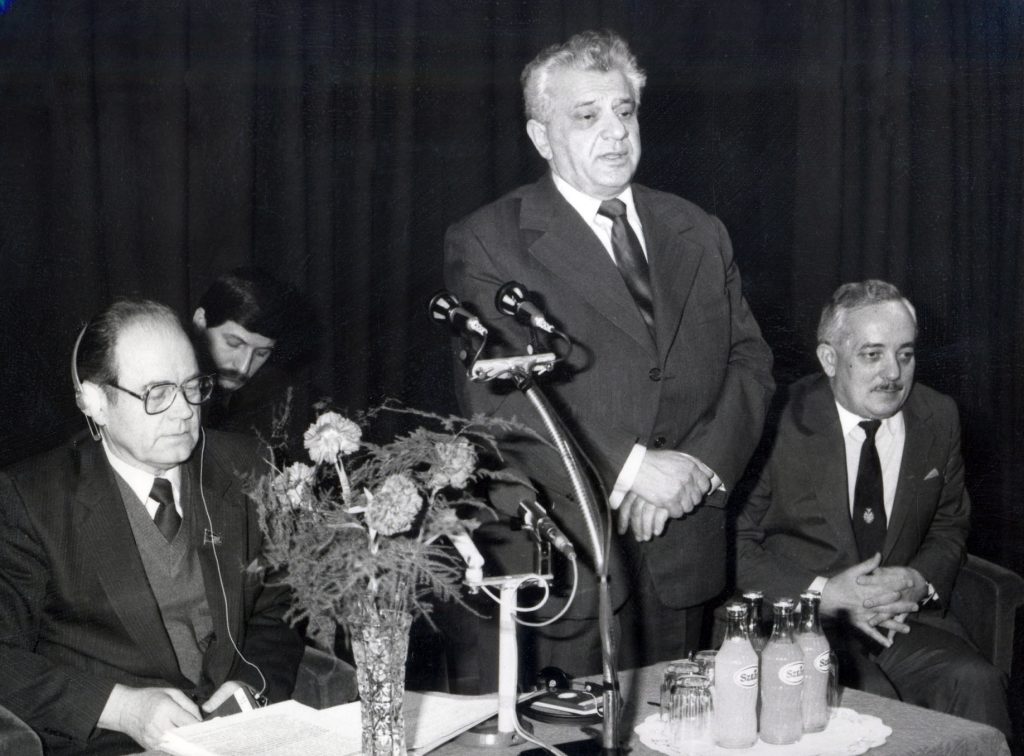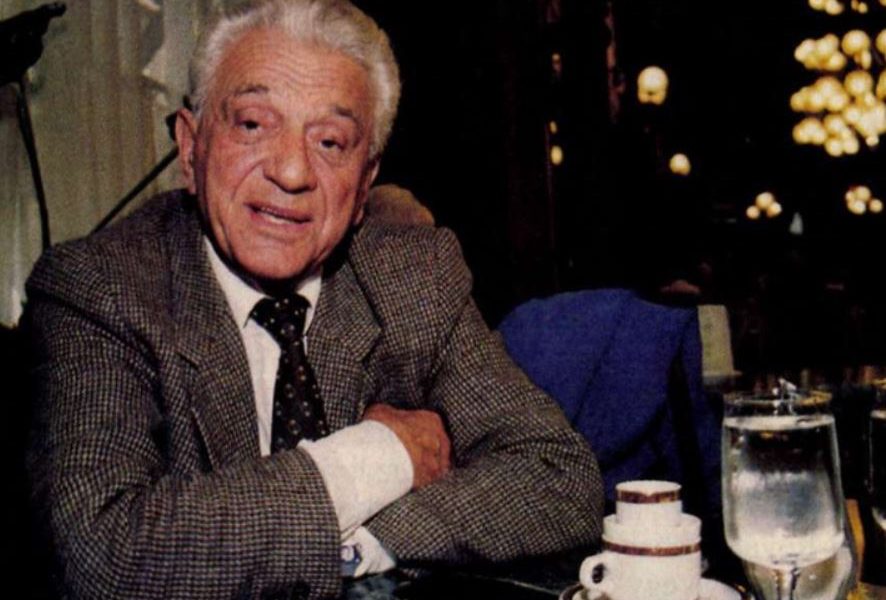The historian Zsuzsanna Borvendég's series was originally published on the PestiSrácok website, but there are certainly those who missed it. But those who haven't read all the parts should also read it again. Knowing the whole picture, can we understand how we got here?
Norbert Siklósi, the media czar of the party state, used Interedition for financial fraud and privatization tricks on the verge of system change. Let's see how!
In 1988, the internal affairs intelligence (BM III/I Group Headquarters) thought it was a good idea to create its first self-founded company by purchasing one of the most important emigrant publishers. What was the purpose of all this? Did he want to open a channel of penetration towards the Hungarian communities in the West, disrupting emigration? A bit of a belated attempt, one might think.
Intelligence on a market basis
In particular, since the mid-sixties, Kádár In 1988, the main goal was to manipulate the privatization processes and in the meantime to exploit the still existing political advantage, but obviously some kind of explanation had to be provided in the various official drafts. And it sounded like this: the goal was to influence Western Hungarians and place the operation of intelligence on a market basis. As we know, integration into the emigration was no longer important at that time, but intelligence gathering on a business basis sounds exciting!
Now in the clutches of the pseudo-Griff
The Hungarian intelligentsia forced into emigration after 1945 created numerous publishing houses and editorial offices in order to preserve Hungarian literature, Hungarian spirituality, historical consciousness and to create publishing opportunities for artists and thinkers who were exiled from their homeland or simply silenced. One of the most famous bookshops was the Újváry Griff Publishing House operating in West Germany. Sándor Újváry founded his book publisher in Budapest under the name Griff in 1938, which continued to operate in Munich from 1952. It had the exclusive right to publish the works of famous Hungarian writers and poets such as Sándor Márai or György Faludi . Márai wrote the following lines to Újváry in early 1985:
...I will only agree to the new edition of my books in Hungary, if the occupying Soviet troops have been withdrawn from the territory of the country, and the Hungarian people have indicated in a democratic, free election what kind of system they wish to live in. First, I do not agree to the re-publishing of my books in Hungary."

image: Wikipedia
Unfortunately, he did not live to see the Hungarian people decide their own fate: on February 21, 1989, he ended his life with his own hand. But even before his death, his wish was in danger, because BM III/I. On January 15, 1989, Group management founded the company Griff Kontinent Kft. by acquiring the publishing house of Újváry and thus acquired its exclusive publishing rights - including Márai's. Márai was not simply threatened by the fact that his works would be published in his homeland before Hungary's sovereignty was regained, but all of this could have been done by the state party's secret police! But what happened in the background?
Siklós state security connection
Sándor Újváry died in 1988, and since he stipulated in his will that his publishing house could not be sold to a foreign organization, the way was opened for domestic companies to profit. And who was the most observant leader of the Hungarian publishing world? Norbert Siklósi, of course . Although Kultúra Külkerkeldelmi Vállalat would have applied for the ownership of Griff, the leader of Pallas made sure that he would change his mind as soon as possible.

Norbert Siklósi, CEO of Lapkiadó Vállalat, president of the journalists' club, greets the participants of the press conference, which was also attended by Borisz Sztukalin (b), ambassador of the Soviet Union to Hungary, and State Secretary Rezső Bányász (j), president of the Information Office of the Council of Ministers. Photo: MTI/László Petrovits
The buyer eventually became Interedition. In addition, Siklósi also had trouble finding the most favorable form for him financially, which is why he needed the involvement of intelligence. Although the III/I. The official action plan drawn up by the group leadership specifically set operational goals such as integration into the Hungarian emigration or easier access to the Western book market, but at the turn of 1988/89, all of this seemed almost a pathetic effort. The real reason why Siklósi wanted to rely on state security is its network connection system. Underworld figures, agents who could be blackmailed, mobsters available for anything were behind the deal. Their manager György Dalmady .
State-sponsored smuggling
Dalmady was born in 1948. In 1969, he graduated from the technical school, and in 1972 he was asked to be admitted to the Ministry of the Interior III. To his main group chief, to an operative position. From 1974, the III/I-7. He worked as an operative employee of the (Emigration) Department. In the meantime, he was admitted to the Faculty of State and Law of ELTE, where he graduated in 1981. His area of operation was the monitoring of the right-wing emigrant community living in East Germany, and he managed several embedded network persons. he built a real criminal network with some of the agents assigned to him Taking advantage of his opportunities, he provided them with easier travel conditions and duty-free, with the help of which he was able to pocket significant sums from the profits of large-scale smuggling activities. The Ministry of the Interior already learned about Dalmady's business in the summer of 1987, but sanctions were not imposed. During 1986, Dalmady's residency increased with the addition of a new agent, whose illegal actions the intelligence agency was already aware of, but wanted to use for its own secret service purposes, so the storm clouds over the officer's head temporarily passed.
Conspiracy hotel
Ernő Reisch became Dalmady's agent under the pseudonym "Kolter". He left Hungary in 1972 and settled in West Germany. The German authorities had trouble with him several times, as he smuggled stolen cars and weapons out of the country and forged documents. He failed and spent a year and a half in a West German prison sometime in the early eighties. After his visit to his home country, the Hungarian interior began to deal with his person, because they considered that he could be used to monitor Hungarian emigrants living in Germany.
Dalmady played big: with his network, they sold stolen cars on the Hungarian black market, illegally imported video cassettes, jeans and perfumes worth millions of forints. (Who would have thought in the late 1980s, when he got hold of these Western items on the street, that he would be buying the contraband almost from the secret service?) Reisch fit perfectly into this company, he even got involved in the smuggling under the guise of state security. Originally, he hoped for much more from signing the agent recruitment documents, since his plan was to open a boarding house in Austria near the border, which he would offer as a conspiratorial meeting place and physical mailbox for Hungarian intelligence. (A secret hiding place where instructions, reports, and various tools can be placed and thus keep in touch with the spies in the field without personal contact.) BM did not reject the opportunity, but was still unwilling to give money to open the boarding house. In another way, he provided Reisch with a financial source: he turned a blind eye to the black trade.
Prison agent turned mobster
Much more polished figures than Reisch also appeared in Dalmady's network. For example Jenő Ungvár , the head chef of the Dunakorzó restaurant. Jenő Ungvár had a history as an agent going back many years. He began his "career" in the Gyorkogsi utca penitentiary, where he entered in 1982 to serve a one-and-a-half-year prison sentence imposed for trafficking. His detention officers were satisfied with the reports he wrote as a prison agent, so he wanted to use his new "craft" learned in prison in civilian life as well. After his release, he offered his services to the internal affairs bodies as the head chef of the Dunakorzó restaurant. The National Police Headquarters used Ungvár, who was still working under the code name "Brill" at the time, to detect organized crime from abroad to Hungary. Over the years, using his cooking skills, he traveled a lot, mainly in Austria, where he established important contacts for BM. Already at that time , he was engaged in large-scale smuggling activities under the cover of the internal affairs, which was not only condoned, but also specifically supported , since a suitable disguise was needed for integration. In a few years, he built up a wide network of contacts, which he needed a more serious background to use. So it could not be a coincidence that - outgrowing the police force - BM III/I was transferred in 1987. To his group boss.
Skeletons in the closet
Information about the activities of Dalmady's gang survived because the officer eventually failed and was suspended from his job on March 20, 1989. His downfall was caused by Reisch, who, if not a hotel, eventually opened a restaurant near the Hungarian border, but he did not pay the rent properly, so his contract was terminated. It was not in the interest of the interior ministry to further cover Reisch's activities and backed away from him, an investigation was launched against him. However, corpses began to fall out of the closet. During the internal investigation, it became clear that the network of connections around Dalmady was much wider than anyone could have imagined. After putting aside the officer acting as the godfather, the group leadership tried to find out what business interests Dalmady had. It wasn't difficult for them, the "business partners" - scared of losing their internal affairs background - volunteered for intelligence.
Head chef at the witch's kitchen of the people's army
Jenő Ungvár first requested a meeting with Dalmady's successor, István László . For the agent, who was working under the code name "Kooh-i-Noor" at that time, the fall of his internal affairs partner caused serious concern, as he was on the verge of closing a very profitable deal, for which he needed the support of intelligence. The meeting took place on April 13, 1989, and was recorded on audio tape by the two operatives who appeared. During the meeting, Ungvár talked about an arms sale deal worth 150 million dollars, in which he agreed with an Austrian citizen named Lenz. According to "Kooh-i-Noor", Lenz was a well-known figure in the international arms trade, a Mossad major. According to the plans, an Austrian bank would have financed the purchase of the stocks released during the demobilization of the People's Army, and the third world was selected as the target market.
On the Hungarian side, a company called Industrialexport wanted to participate in the business, whose CEO Ungvár was already in contact with at that time. Since the head of the state-owned company wanted to be assured that Jenő Ungvár was supported by an "official person" in conducting the business, "Kooh-i-Noor" was forced to call his newly appointed maintenance officer to a meeting to inform him of the upcoming action. State security people were cautious. They didn't want to entrust Ungvár with tasks for the time being, but they didn't put any obstacles in the way of the ongoing case, and they told him that if he got hold of a description of modern weapons, they would claim it.
MNVK-2 for Ungvár. he may have had connections in his association, at least through his brother, Gyula Ungvár , the deputy head of the material and technical group of the Ministry of National Defense, he had previously provided technical descriptions to military intelligence. The planned arms purchase was cancelled. The Austrian authorities rolled up an international network, during which threads also led to Hungary. An arrest warrant was issued against Jenő Ungvár, and it was established that Hungarian official bodies were also involved in the case, thereby violating Austria's neutrality and causing financial harm to the country. Despite this, Ungvár enjoyed the protection of his country, so he could continue his unlawful actions. His passport was confiscated, but the domestic track remained free for him. In Solymár, he set about creating a luxury brothel disguised as a massage parlor, with influential business partners such as Péter Kunos the state secretary of the Ministry of Finance, or Josef von Ferenczy , the powerful media mogul.
And Dalmady went to prison, so the fate of the Griff Kontinent became uncertain, but Siklósin could not be caught.
Source: PestiSrácok
Author: historian Zsuzsanna Borvendég
(Header image: PestiSrácok archive)












